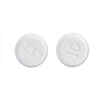Amlodipine
This is a prescription item
We’ll collect your veterinarian’s information at checkout to authorize the prescription.

Don’t have a veterinarian? Book an appointment with Vetster
 Temporarily Out of Stock
Temporarily Out of Stock
 Thank you, we will notify you when this product is available.
Thank you, we will notify you when this product is available.
What is Amlodipine?
Amlodipine besylate is used in dogs and cats for the treatment of systemic hypertension (high blood pressure). Although Amlodipine besylate is not FDA-approved for use in veterinary medicine, it is a commonly accepted practice for veterinarians to prescribe this medication for dogs and cats. Amlodipine requires a prescription from your veterinarian, and is sold per tablet.
For:
Dogs and Cats
Benefits:
- Treats high blood pressure in dogs and cats
- Relaxes the arterial muscles to help decrease blood pressure
How it Works:
Amlodipine is known as a calcium-channel blocker. It works by blocking the calcium needed for muscle contraction. Amlodipine works primarily on the arterial muscles to relax them so they can dilate and the blood pressure decreases.
Cautions:
Notify your doctor if your pet has liver problems before administering this medication. Amlodipine should not be used in pregnant or lactating animals. If used in a dog, this medication may also cause the blood to take longer to clot.
Brand Name:
Norvasc
Generic Name:
amlodipine besylate
What is the most important information I should know about amlodipine besylate:
Amlodipine besylate is a prescription medication not FDA approved for veterinary use; however, it is a commonly accepted practice for veterinarians to use this medication in dogs and cats. Amlodipine besylate is available as 2.5mg and 5 mg tablets. The usual dose to treat systemic hypertension in cats is 0.625mg (1/4 of a 2.5mg tablet) by mouth once a day. The usual dose for dogs is 0.025 to 0.05 mg/lb by mouth once a day.
What is Amlodipine besylate:
Amlodipine besylate is a calcium channel blocker. Calcium channel blockers affect the heart and blood vessels. Amlodipine besylate is used to treat certain high blood pressure especially in pets with kidney disease. Amlodipine besylate may also be used for purposes other than those listed in this guide.
What should I discuss with my veterinarian before giving amlodipine besylate to my pet:
Tell your veterinarian if your pet has heart disease, or liver disease. Tell your veterinarian if your pet is pregnant or nursing.
How should this medication be given:
Give this medication exactly as directed by your veterinarian. If you do not understand the directions ask the pharmacist or veterinarian to explain them to you. Amlodipine besylate can be given with food. Do not stop giving amlodipine besylate. A missed dose can result in a sudden rise in blood pressure which can lead to blindness, kidney damage, seizures, or collapse. Store amlodipine besylate at room temperature away from moisture and heat. Keep this medication away from children and pets.
What happens if I miss giving a dose:
Give the missed dose as soon as you remember during the same day. However, if you don't remember until the next day, skip the dose you missed and give only the next regularly scheduled dose. Do not give a double dose of the medication.
What happens if I overdose the pet:
Seek emergency veterinary medical treatment. Symptoms of amlodipine besylate overdose include staggering due to dizziness, collapse, or slow heart rate.
What should I avoid while giving Amlodipine besylate to my pet:
Amlodipine besylate should not be used in animals allergic to it. Use amlodipine besylate with caution in animals with heart failure or liver disease. Do not use in breeding, pregnant, or nursing females. Do not use in breeding males.
What are the possible side effects of Amlodipine besylate:
For dogs and cats, if any of the following serious side effects occur, stop giving amlodipine besylate and seek emergency veterinary medical attention; an allergic reaction (difficulty breathing; swelling of the lips; tongue or face; hives). In cats side effects are rare but may include drowsiness, loss of appetite, weight loss, swelling of the gums, or rapid heart rate. In dogs, may also cause the blood to take longer to clot. Other side effects may also occur. Talk to your veterinarian about any side effect that seems unusual or bothersome to the animal.
What other drugs will affect Amlodipine besylate:
Tell your veterinarian if your pet is being given aspirin, warfarin (Coumadin), diuretics (furosemide, Salix), beta blockers (atenolol), and other blood pressure medications. Drugs other than those listed may also interact with amlodipine besylate. Talk to your veterinarian or pharmacist before giving any prescription or over the counter medicines including vitamins, and supplements.
Where can I get more information:
Your pharmacist has additional information about Amlodipine besylate written for health professionals that you may read. Call your veterinarian for medical advice about any side effects to your pet. You may report side effects to the FDA at 1-800-FDA-1088.
Amlodipine Directions:
- Give Amlodipine to your pet exactly as your veterinarian prescribes.
- If you miss giving your pet a dose of Amlodipine, give the next dose as soon as you remember or, if it is close to the next scheduled dose, return to the regular schedule. Do not double the dose to catch up.
The medication can be given with food.
Amlodipine Dosage:
| Weight | Dosage |
|---|---|
| All weights | 0.625mg (1/4 of a 2.5 mg tablet) once a day. |
| Weight | Dosage |
|---|---|
| All weights | 0.025 to 0.05 mg/lb once a day. |
| Horses | Do not use! |
|---|
Storage:
Store this product at room temperature.
Amlodipine Ingredients:
| Active Ingredient (per tablet) | Amount |
|---|---|
| Amlodipine besylate | 2.5 mg |
| Active Ingredient (per tablet) | Amount |
|---|---|
| Amlodipine besylate | 5 mg |
 Swipe
Swipe
Customers also boughtView All
 Swipe
Swipe













































